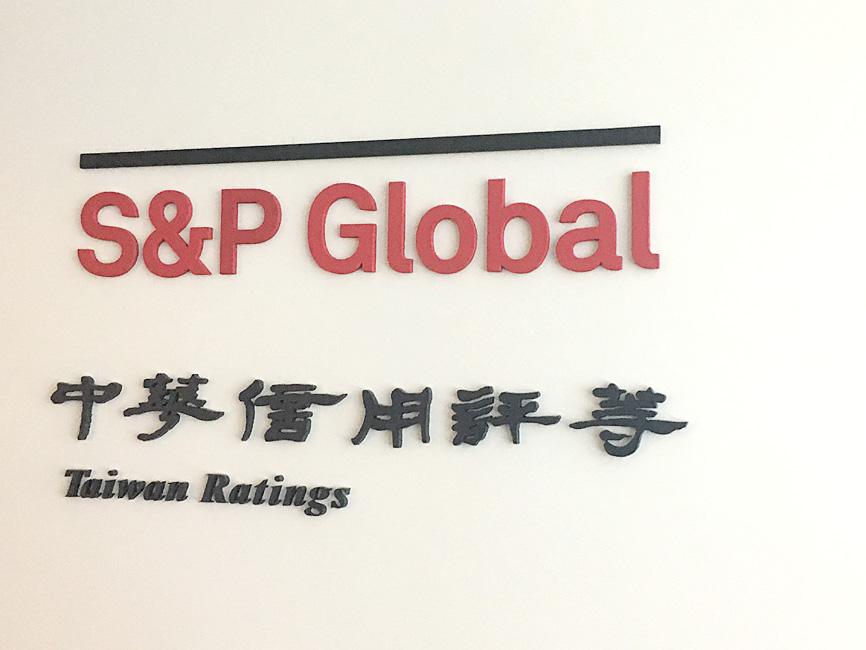S&P Global Ratings has raised Taiwan’s GDP growth forecast from 1 percent to 1.64 percent for this year, while trimming the pace from 3 percent to 2.9 percent for next year, amid the benefits of a stay-at-home economy and optimism that COVID-19 vaccines would reduce downside risks.
The rollout of vaccination programs against the COVID-19 outbreak would support a stable outlook for Taiwan’s economy this year and next year, despite global demand being ravaged by the pandemic, corporate credit analyst Raymond Hsu (許智清) at Taiwan Ratings Corp (中華信評), the local arm of S&P, told a news conference in Taipei yesterday.
“Growth risk is now neutral as multiple vaccine successes increase recovery upside,” Hsu said.

Photo: Clare Cheng, Taipei Times
Taiwan has emerged from the pandemic unscathed, thanks to its effective handling of the outbreak, and an unexpected boom in demand for remote working and schooling devices, Hsu said.
Strong electronics exports and low material costs have bolstered the outlook for local firms, with the earnings of top corporations beating the agency’s expectations, he said.
Downside risks, while retreating, remain, while ongoing virus containment measures and growing debt worldwide could derail the post-pandemic recovery, Taiwan Ratings said.
High inventories and receding demand from the low-contact economy are substantial risks, particularly for the technology sector, Hsu said.
Other risks include oversupply from aggressive investments in China, technology shifts and rising production costs for capacity diversification, he said.
COVID-19 pains could persist for chemical companies, with their business outlook staying negative, Hsu said, adding that a recovery could be pushed back to 2022 and beyond for oil refining despite improving oil prices.
Massive capacity expansions in China are unfavorable to recovery and Taiwan’s exclusion from regional trade bodies would add long-term pressure on chemical companies, with the bulk of their capacity in Taiwan, he said.
Domestic auto sales are stable, helped by domestic demand, while the global auto market looks much weaker, he said.
The pandemic would continue to hamper air travel and container carriers have not yet come out of related risks, Hsu said.
The banking sector might see moderate loan growth of 4.5 percent next year, supported by a projected 3 percent GDP growth, Taiwan Ratings financial analyst Andy Chang (張書評) said.
However, low interest rates and market volatility could continue to squeeze the sector’s profitability, with its pretax return on assets expected to drop to a decade-low of 0.4 percent, from 0.49 percent this year, Chang said.
Bad debts would rise next year after relief and subsidy programs expire, he said.

Taiwan will prioritize the development of silicon photonics by taking advantage of its strength in the semiconductor industry to build another shield to protect the local economy, National Development Council (NDC) Minister Paul Liu (劉鏡清) said yesterday. Speaking at a meeting of the legislature’s Economics Committee, Liu said Taiwan already has the artificial intelligence (AI) industry as a shield, after the semiconductor industry, to safeguard the country, and is looking at new unique fields to build more economic shields. While Taiwan will further strengthen its existing shields, over the longer term, the country is determined to focus on such potential segments as

UNCERTAINTY: Innolux activated a stringent supply chain management mechanism, as it did during the COVID-19 pandemic, to ensure optimal inventory levels for customers Flat-panel display makers AUO Corp (友達) and Innolux Corp (群創) yesterday said that about 12 to 20 percent of their display business is at risk of potential US tariffs and that they would relocate production or shipment destinations to mitigate the levies’ effects. US tariffs would have a direct impact of US$200 million on AUO’s revenue, company chairman Paul Peng (彭雙浪) told reporters on the sidelines of the Touch Taiwan trade show in Taipei yesterday. That would make up about 12 percent of the company’s overall revenue. To cope with the tariff uncertainty, AUO plans to allocate its production to manufacturing facilities in

COLLABORATION: Given Taiwan’s key position in global supply chains, the US firm is discussing strategies with local partners and clients to deal with global uncertainties Advanced Micro Devices Inc (AMD) yesterday said it is meeting with local ecosystem partners, including Taiwan Semiconductor Manufacturing Co (TSMC, 台積電), to discuss strategies, including long-term manufacturing, to navigate uncertainties such as US tariffs, as Taiwan occupies an important position in global supply chains. AMD chief executive officer Lisa Su (蘇姿丰) told reporters that Taiwan is an important part of the chip designer’s ecosystem and she is discussing with partners and customers in Taiwan to forge strong collaborations on different areas during this critical period. AMD has just become the first artificial-intelligence (AI) server chip customer of TSMC to utilize its advanced

Chizuko Kimura has become the first female sushi chef in the world to win a Michelin star, fulfilling a promise she made to her dying husband to continue his legacy. The 54-year-old Japanese chef regained the Michelin star her late husband, Shunei Kimura, won three years ago for their Sushi Shunei restaurant in Paris. For Shunei Kimura, the star was a dream come true. However, the joy was short-lived. He died from cancer just three months later in June 2022. He was 65. The following year, the restaurant in the heart of Montmartre lost its star rating. Chizuko Kimura insisted that the new star is still down